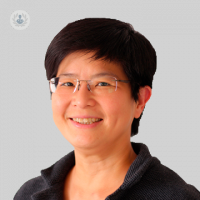What you should know about infertility
Autore:Fertility is something which many couples struggle with on the road to expanding their family. Specialist in reproductive medicine and surgery Professor Cheong discusses infertility, including how to know if you are infertile, and how successful fertility treatment is.

What causes infertility?
Infertility can be caused by several factors. Some of these can be female-related factors, including as having issues with ovulation, such as struggling to produce an egg. Issues can also arise with the fallopian tubes, which are connected to the womb and the ovaries, and carry the eggs into the womb or the uterus.
Problems may also arise due to issues with the womb itself. The uterus is where the baby grows, but if, for example, it's scarred or it has tumours or polyps. These all contribute to having difficulty conceiving.
Infertility is not solely due to the female partner; the male partner men can also contribute to infertility. Issues may take place due to a lack of optimal sperm count. It may be low due to various different reasons; the sperm may not be moving in the right direction, with the right amount of motility.
Additionally, men can have issues with sperm morphology, where the sperm doesn't look normal due to multiple factors. In a third of the patients, such issues take place due to a combination of both male and female factors,
However, it is important to remember that having regular exercise, a good diet, keeping healthy, and taking the right amount of supplements to help with health are all very important in terms of helping improve fertility.
Is infertility more common in men or women?
The question of whether fertility is contributed more by males or female is a very individual one. Certain couples may have more of a problem associated with the male partner, and then due to various different reason, including medical issues such as cancer treatment, which can affect their sperm quality. However, of course, some couples sttruggle with predominantly female issues, and some of these women may need surgery to help improve their condition, while others may need some medication or some tablets to improve their ovulation.
The issue around whether male or female contributes to the fertility problem is a very individual one, and tests will be performed at your consultation with a fertility specialist in order to determine what is the key issue in the particular couple or patient.
How do you know if you are infertile? (e.g symptoms, signs, common conditions affecting fertility)
The majority of patients come to my clinic to seek help because they have been trying to conceive for a long time. The National Institute to the Institute of Clinical Excellence (NICE) in the UK, and worldwide, defines infertility as when a couple has been trying regularly over a 12-month period or longer and has not conceived.
However, it is also important to realise that fertility is very influenced by age, particularly in a woman. Fertility decreases after 35 years of age, and it's important to realise that if you're closer to 40 than in your 30s, then it might be useful to seek fertility advice sooner rather than later.
This means that you will be prepared in case you do need fertility care treatment. Although most patients come After 12 months of trying, there are certain conditions or certain situations where I see patients earlier.
An example of one of these conditions is lack of ovulation; where patients have irregular periods, no periods at all, or polycystic ovaries. These patients seek help earlier because if eggs are not produced, conception will not take place.
How successful is fertility treatment?
Fertility treatment has come a long way over the years, and the technology is highly successful. However, we must realise that conception is never a hundred per cent guaranteed; it is important to understand that there can be uncertainty around whether this treatment is going to succeed or not.
On average, in a patient who is young, there is normally a one in three chance of success, potentially even higher than that. However, each patient's individual condition and context affects their success rate.
I would say fertility treatment such as IVF has progressed enormously. It does work and has improved in its success rate, but there is still uncertainty surrounding the treatment.
The support that we provide as doctors is essential because the journey towards conception can be emotionally challenging. We help by ensuring that your journey is supported and we help to do this through counselling services. We use technologies such as medical apps in order to assist your journey to make it easier and reduce the burden that you have in your journey while you go through a number of fertility treatment cycles, in order to get to where you need to go.
If you are you are struggling with fertility and would like to book a consultation with Professor Cheong, simply visit her Top Doctors profile today.


